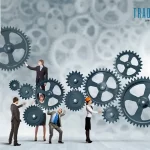The traditional 9-to-5 job is considered the ideal of work, but it is losing appeal. The new generation of workers, raised in a world of hyper-connectivity, the gig economy, and rapid digital change, is increasingly rejecting the monotony of established routines. Instead, they seek dynamic jobs, flexible schedules, and work environments that mirror the fluidity of their personal lives. The key question for today’s employers is: Are we ready to handle a workforce that hates routine?
Table of Contents
A Change in Generation Work Philosophy
This change is being spearheaded by Gen Z and millennials, who currently constitute the greatest portion of the global workforce. The 2023 Global Gen Z and Millennial Survey by Deloitte reveals that flexibility of work location and time is among the most important priorities of young professionals. More than 75% indicated that they would quit a job that lacks sufficient flexibility.
The rationale for this change lies in the culture that these generations grew up in, which is characterised by continuous change, real-time updates, and digital multitasking. Fast innovation, distant access, and an on-demand lifestyle are the features of their world. To them, the routine may even translate to stagnation, uncreativity, and even mental fatigue.
The Emergence of Dynamic Work Models
Progressive companies now adopt fluid, long-term operating models like hybrid and remote work, emphasising asynchronous communication and outcome-based performance. Companies such as Atlassian, GitLab, and Spotify offer flexible schedules, allowing employees to choose their hours. Talent can transfer across departments and geographies based on need and interest, thanks to project-based staffing models.
Technology as a Means to Flexibility
This paradigm shift has been made possible by the adoption of digital tools. AI-based productivity tools, real-time messaging apps, and cloud collaboration platforms have never made decentralisation and personalisation of work so easy. Planners such as Notion, Slack, and Monday.com are no longer only task management tools but also the means to develop a specific workflow that meets personal needs.
In addition, repetitive, time-consuming tasks are being replaced by automation and AI, leaving workers with the ability to engage in strategic, creative, or high-value work. McKinsey predicts that 30% of work activities in 60% of occupations are possible for automation, a chance to get rid of routine and reinvent jobs.
The Mental Health Imperative
The fixation on fluidity is about lifestyle and well-being. The report of the American Psychological Association released in 2022 emphasised that the lack of autonomy and monotony are the major causes of burnout. To digital natives, who live on novelty and self-direction, fixed routines are emotionally demanding.
Employers who adjust enhance productivity, mental health, and involvement. Businesses such as Google and HubSpot have adopted flex weeks and no-meeting days as a way of fighting against routine fatigue. Some are even trying four-day weeks and personalised leave.
Issues and Problems
But this change has issues. Organisations must balance flexibility with accountability, culture with personalisation, and innovation with consistency. Managers face the dilemma of guiding performance versus micromanaging.
Fragmentation and inequity also pose risks. Employees with less access to technology or working from home may be left behind. Not all positions can be flexible; frontline, manufacturing, and logistics roles often need structure.
Leaders should address these inequities by ensuring inclusive operations and expanding flexible work beyond a small group.
Operations to HR: A Systemic Transformation
Change should be systematic in order to prepare a routine-averse workforce. HR policies should move out of the rulebook style to a more flexible model. The redefinition of job roles to comprise skill clusters and project cycles rather than fixed job responsibilities should be adopted. Performance reviews should focus on punctuality, completion of tasks, results, creativity, and teamwork.
Operationally, firms require faster processes. It entails dynamic teaming, cross-functional teamwork, and lifelong learning environments. The leadership development programmes also need to change and provide managers with such skills as coaching, emotional intelligence, and digital fluency.
Education and Upskilling: Readiness in Fluid Careers
Even schools are changing. Colleges and educational institutions are shifting towards interdisciplinary and modular study programmes. The categories of credentials are becoming more fluid, with micro-certifications, boot camps, and self-paced learning becoming more popular.
This change indicates the fact that the current employees are not willing to merely perform work, but create their careers, which would develop along with them. Lifelong learning, flexibility, and innovative independence are becoming the new employment currency.
Embracing the Nonlinear Workforce
The shift from clock-in/out productivity to a nonlinear, individualised work culture reflects a workforce that is ambitious, creative, and futuristic rather than lazy or disloyal. Employers viewing this change as an opportunity will foster more innovation, loyalty, and growth. Adapting requires a mindset shift, redefining productivity, leadership, and success. Prosperous businesses will engineer flexibility, not impose structure, as the future is fluid for a routine-averse workforce.






